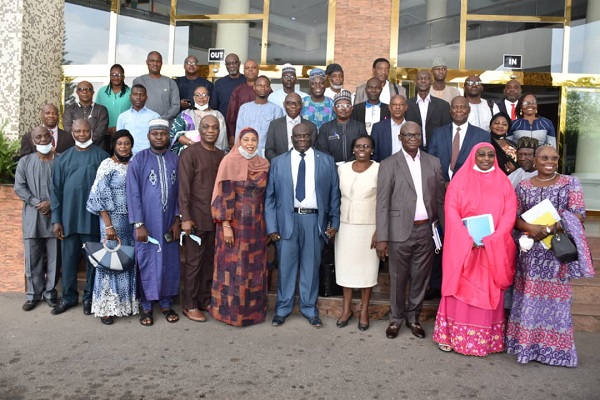
The Minister of Agriculture and Rural Development, Alhaji Muhammad Nanono, has said the Federal Government’s commitment towards improving the aquaculture sub sector would increase domestic production of fish to reduce importation of frozen fish into the country and growth in gross domestic product (GDP) in the agric sector.
In his speech at the International Dialogue on the Transformation and Future of Aquatic Food Systems in Nigeria held in Abuja, he said the ministry under the present administration was pursuing a holistic approach to the development of fisheries and aquaculture sub-sector through the diversification programme of the government along the value chain process, adding development of the nation’s fisheries and aquaculture sector was highly critical to this.
The minister who was represented by the director, fisheries and aquaculture department, Dr. Ime Umoh, stressed that the important role of fish in food and nutrition security could not be overemphasized, being a good source of protein for human diet and containing essential amino acids required by humans in the right quantities which are usually lacking in most national staple foods.
Saying fish remains a valuable nutritional supplement and a virile candidate for addressing food and nutrition security in the country, he stated that despite the potential impacts of the fisheries and aquaculture resources, the sector was confronted with numerous challenges, including high cost of inputs, use of unimproved breeds in aquaculture and the need for improved access to finance, among others.
He pointed out that the ministry was willing to engage and partner all stakeholders for the development of the sector for economic growth, wealth and job creation as well as food and nutrition security.
“The vision of Mr. President is to grow Nigeria’s agricultural sector to achieve a hunger-free Nigeria through agriculture that drives income growth, accelerate achievements of food and nutritional security, generates employment and transform Nigeria into a leading player in global food/fish market to create wealth for millions of practitioners.
“The outcome of this dialogue will feed into the development of a consolidated country report. Hence, as you subject every item on the agenda to scrutiny through the various breakout groups, to identify key recommendations that will bring notable transformation to the aquatic food systems of the country,” he added.
He said his ministry had played a key role in addressing aquatic food systems in the country, notably backward integration policy of government to encourage fish importers to go into commercial aquaculture (pond and cage culture) of fish and shrimp farming, establishment of fish farm clusters nationwide, establishment of fish feed mills in each of the six geo-political zones of the country.
“Other programmes include lake enhancement programmes for stock assessment and stocking of water bodies nationwide to increase their productivity, capacity building of farmers, extension workers, women and youth with the provision of starter packs for job and wealth creation, among others,” he added.
The minister appreciated the commitment of the Global Alliance for Improved Nutrition (GAIN), the Bill and Melinda Gates Foundation and the ministry staff towards organizing the programme and ensuring it became a reality.
Earlier in his address, the ministry’s permanent secretary, Dr. Ernest Umakhihe, who was represented by the head of aquaculture and deputy director, fisheries and aquaculture department, Mr. Istifanus Pwaspo stated that fish is one of the cheapest and predominant sources of animal protein in the country.
“It accounts for about 50 per cent of total animal protein consumed in Nigeria with per caput consumption of 17.5 Kg /person/year. In this regard, the total demand for fish is 3.6 million tons annually while Nigeria is producing 1.1million tons from all sources (aquaculture, artisanal and industrial sectors) leaving a deficit of about 2.5 million tons to be supplemented by importation,” he said.
According to Umakhihe, it is estimated that over 10 million Nigerians are actively engaged in primary and secondary fisheries operations. The contribution of fisheries to the National Gross Domestic Product (GDP) is about 4.5 per cent.
In his remark, the country director, Global Alliance for Improved Nutrition (GAIN), Dr. Michael Ojo said Nigeria had seen significant growth in production over the past 18 years, adding “but we still have a large supply deficit limiting access for consumers and potentially contribution to relatively high cost of aquatic foods.”
He contended the factors that constrain the supply of safe and affordable fisheries products to meet consumer demand were multiple and resided at many different points in the supply chain.


